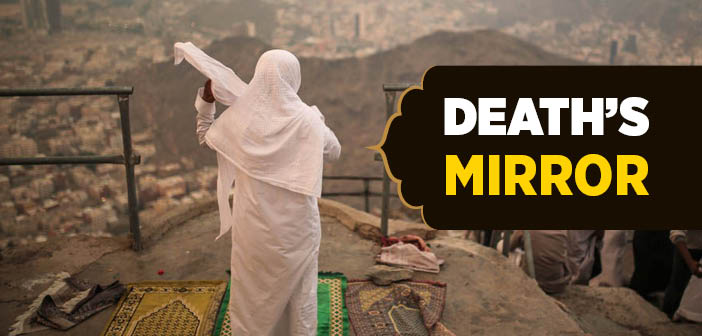What does deaths mirror in islam?
The death that every living being will one day certainly face is like a personal Doomsday unique to the individual. Just as there will be no fear and no sorrow on the Day of Resurrection for those who believed in Allah and who spent their lives doing good actions in service and obedience to their Lord, the same will be true for their moment of death. In this respect, death will manifest itself in accordance with the spiritual degree of the person.
How aptly Mawlana Jalaladin Rumi (may Allah have mercy on him) expresses this truth:
“Son, everyone’s death has the same hue they have. To the enemy of Allah, who does not deem it reunion with Him, a formidable enemy and to the friend of Allah, a friend.
O soul that flees from death! It is not death you fear, but your own bad actions and forgetfulness.
For what you find in death’s mirror is not the image of death, but your own ugly face. Your spirit is like the tree and death the leaf. Each leaf grows forth from the tree…”
“The Last Day is a terrible day of slaughter for piebald cattle. That day is an hour of destruction for cattle and a festival for the true believers.”
Just as the believers rejoice on the Eid al-Adhar (the celebration of the sacrifice) and animals are put to the slaughter, the state of human beings on the Last Day will resemble one of these two states, in accordance with their choices and lives in this world. They will either be of those who rejoice, or those who merit punishment.
Because of this truth, if a person leads their life enslaved to their lower self, believing only in this world and the pursuit of its pleasures, then their grave will be in the form of a dark dungeon ridden with dread and nightmares. The horror of death will cause them unimaginable suffering.
But when a slave transcends their lower appetites and worldly desires and advances in the direction of higher qualities hidden in their spirit, death is viewed as an inevitable condition of reunion with their All-Great and All-Transcending Lord. Thus, death, a cause of cold chills for most, becomes transformed into the reunion with the ‘Exalted Friend.’
Mawlana Jalaladin Rumi (may Allah have mercy on him) viewed the night of his own death as his shab-i’arus (wedding night), or being freed from a worldly separation to attain ultimate reunion with the Beloved, has said:
“On the day of my death, when they carry my coffin, do not think that I have any worldly concerns. Do not suppose that I am pained at leaving this world. Do not weep for me, say not, “Alas, alas!” Were I to fall into Satan’s snare while alive, that would indeed be alas!
When they commit me to the earth, say not, “Farewell, farewell!” Know well that this time will be for me not separation, but reunion.
The grave is a veil drawn over the bliss of the Garden. You have seen the setting of my sun, have you not? Behold, too, the rising! Can setting impair the sun and the moon?
This state seems to you like a setting, while it is in fact a rising, a return to life!
Can a seed that falls into the earth ever be called dead?
Know well that death is the pain of the spirit’s birth into another realm. In name, it is death in this fleeting realm, but in reality it is called ‘birth’ into the eternal abode.
And is it not Allah who takes life? Then know that death is for His special servants as sweet as sugar. For death, even if fire, is a rose garden and the water of life for a friend of Allah.”
Thus, death is not annihilation, it is birth into eternal life. Just as coming to this world is birth for a baby, the spirit’s leaving the body and going to the intermediate realm is also a birth into another realm – the Next World.
Source: Osman Nuri Topbaş , Journey To Eternity, Erkam Publications



